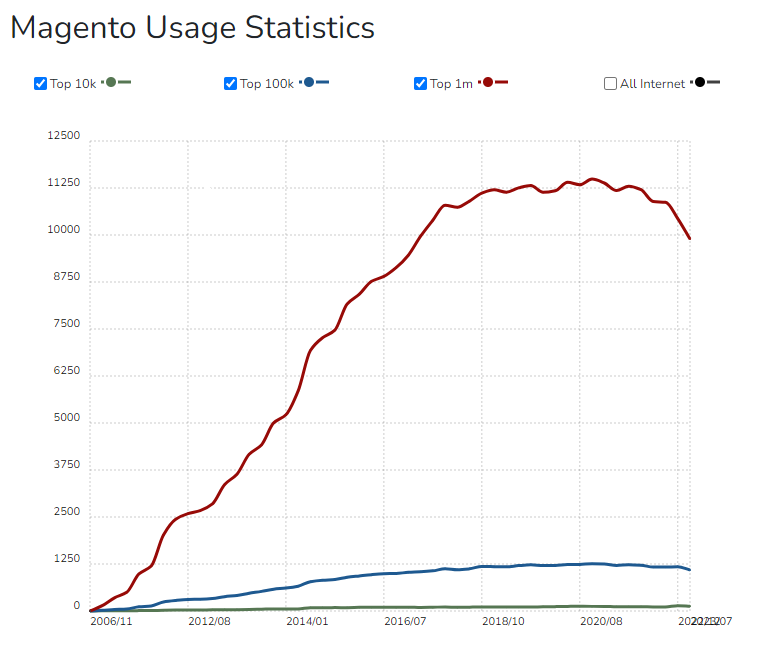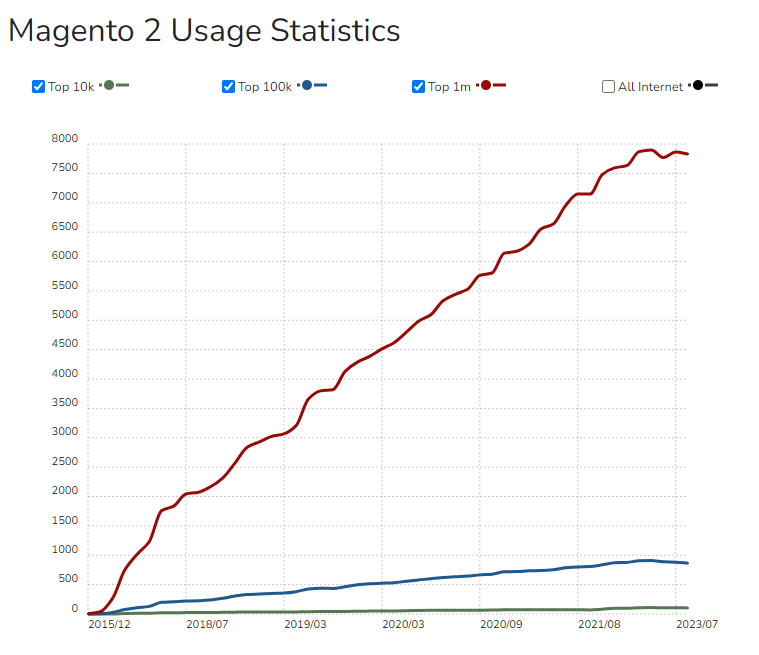
In this evolving eCommerce landscape, the choice of platform for developing your online store can make or break your online presence. Two prominent contenders that have been many years in this game are Shopify and Magento.
Within a short time period, Shopify has outshined Magento and Magento 2. A significant shift has occurred in recent years as Shopify has emerged as the most widely chosen platform over Magento. As of November 2023, there are more than 7M websites powered by Shopify[1] . This eCommerce platform has been soaring high since 2008, as can be seen in the graphical representation below.

On the other hand, there are only about [6lacs sites powered by Magento 1] , and [2lacs+ powered by Magento 2], which is far less than Shopify.


Shopify vs. Magento: Why Shopify Wins the eCommerce Game?
1- User-friendliness
It is vital to consider the user-friendliness of the eCommerce platform before utilizing it. This is because an intuitive platform is easier to update and modify, and when business requirements evolve or technology advances, the platform will be easy to adapt, saving time and resources in the long run.
Shopify
When it comes to user-friendliness, Shopify is a beginner-friendly platform and offers better eCommerce website accessibility. Setting up and managing an online store is straightforward and intuitive with Shopify, even for individuals with limited technical knowledge. This makes it a go-to choice for entrepreneurs, small businesses, and those who want to quickly establish an online presence.
You can get your online store up and running in a short span of time with Shopify. However, although it eliminates the burden of extensive technical requirements, you still have to possess basic technical knowledge to develop an online store with this eCommerce platform. To simplify the process, you can hire a Shopify developer to do it effectively for you.
Magento
In contrast, Magento is known for its complexity, particularly for users with limited technical expertise. While Magento 2 has made efforts to improve the user interface, it can still be challenging for beginners. This eCommerce platform has a steeper learning curve, requiring store owners and administrators to gain ample proficiency in managing and customizing their Magento store. It may be better suited for businesses with dedicated development teams. Otherwise, organizations can also partner with a Magento development company to cater to their online store development requirements.
The winner
Shopify is the clear winner here and can be considered to be the best choice for beginners and those looking for a hassle-free and quick digital setup. However, the end choice depends on your technical skills and the specific needs of your eCommerce business.
2- Scalability
Both Magento and Shopify offer scalability, but they do so in different ways. Here’s a comparison of how each platform approaches the scalability factor.
Shopify
From small startups to large enterprises, Shopify caters to businesses of all sizes, as it is designed to be scalable. Being a fully hosted solution, Shopify takes care of server maintenance, security, and scalability. This makes it easy for businesses to scale without worrying much about technical aspects. Shopify also leverages CDNs that minimize latency and enhance user experience.
Magento
When it comes to scalability for large enterprises with complex requirements, Magento wins. Its self-hosted nature provides control over hosting and infrastructure, making it perfect for businesses with specific hosting requirements.
The winner
Here, the winner depends on your specific business size and customization needs. For a large enterprise with complex needs, Magento can be the preferred choice; but Shopify would be the winner if you value ease of use and a platform that can scale without requiring in-depth technical expertise.
3- Pricing
Many assume that owing to it being better and more popular than Magento, Shopify is definitely expensive. Let’s understand which is more cost-effective.
Shopify
The pricing plans in Shopify clearly cover hosting and essential features. While it is not a free platform, the value it provides in terms of hosting, features, and cost-effectiveness makes it perfect for businesses of every size.
Each Shopify plan is well-defined and comes with a specific set of features allowing businesses to choose the plan that aligns with their needs and budget.
Let’s have a look at the different pricing plans available on Shopify.
| Shopify Lite | Basic Shopify | Shopify | Advanced Shopify | Shopify plus | |
| Monthly price | $5/month | $39/month | $105/month | $399/month | $2000/month |
| Suitable for | To sell on social media-limited features, optimized for mobile | Startups or businesses with existing storefronts | Larger businesses that require gift cards and cart recovery | Companies with advance needs and larger product catalogs | Suitable for enterprises selling for corporations or high-growth businesses |
Magento
Magento provides more flexibility in terms of open-source options but often has other related expenses like upfront investment in hosting and development. Unlike Shopify, Magento offers a complex and customized pricing structure. Here’s a breakdown of Magento’s pricing options.
| Magento open-source | Magento commerce | Magento commerce cloud | |
| License cost | 0 | $22,000–125,000/year | $40,000–190,000/year |
Apart from the licensing cost, you will also need to pay for domain name ($10–400/year), SSL certificate ($50–300/year), extensions ($60–600/extension), and many more.
The winner
Shopify stands out as a cost-effective choice for small to medium-sized businesses, while Magento is more expensive due to its hosting and development costs.
4- Themes and Templates
Both Magento and Shopify offer a range of themes and templates to help businesses create visually appealing online stores. Let’s see how Shopify is ahead in this aspect from Magento.
Shopify
It comes with an extensive Theme Store where users can choose from various professionally designed themes. These are developed with a mobile-first approach ensuring responsiveness on different devices.
As a hosted solution, Shopify offers a streamlined approach and a curated selection of themes that are easy to customize and cater to a broad range of industries. Users can modify the design and layout of Shopify themes according to their specific needs.
Moreover, Shopify offers both free and premium themes, wherein free ones provide essential features, while premium options come with more advanced features.
Magento
Magento’s marketplace provides a selection of themes and templates for users. There are both free and paid options, with a variety of design functionalities. While Magento themes are highly customizable, the process can be time-consuming and demands a higher level of technical expertise.
Therefore, if you have time constraints and limited or no experience in customizing a theme, we advise you to hire a Magento developer for it.
The winner
While Shopify emphasizes simplicity and a more straightforward selection process, Magento stands out for its extensive customization capabilities, making it a preferred choice for businesses with unique design requirements and technical expertise.
Shopify is the winner if you prioritize ease of use. It will be well suited if you have limited technical expertise and want to customize your online store without excessive coding.
Ultimately, there is no one-size-fits-all answer, the final choice depends on your business objectives, priorities, resources, and level of technical expertise.
5- Hosting and Server Management
The importance of hosting and maintenance can not be overstated in a website or online store. Both Shopify and Magento have distinct approaches to hosting and maintenance.
Shopify
As stated earlier, Shopify is a fully hosted eCommerce platform and takes care of all the hosting and server maintenance. This eliminates the need for users to manage servers, perform software updates, or worry about server security. Its cloud-based architecture provides scalability, making it easy for businesses to handle traffic spikes.
Moreover, Shopify includes a global content delivery network (CDN) that helps speed up page loading times for visitors by serving content from the closest server location. This enhances the user experience for customers globally.
Magento
This provides flexibility in terms of hosting. You can choose to self-host Magento using your preferred hosting provider or opt for Magento Commerce Cloud, a cloud-hosted solution.
With self-hosted Magento, you are responsible for managing your server, which includes performing updates, maintaining security, and ensuring server performance. This demands more technical expertise.
The winner
Overall, it is clear that Shopify simplifies hosting and maintenance by providing a fully hosted solution with a strong focus on security and reliability. It’s an excellent choice for businesses that want to avoid the technical complexities of server management.
6- Payment and Checkout Options
Shopify
Apart from supporting a wide range of payment gateways, Shopify also provides its own, known as ‘Shopify Payments’, which is integrated into the platform. Shopify’s payment gateway streamlines the checkout process for users (countries in which it is available), offering convenience and low transaction fees.
Magento
Like Shopify, Magento also offers a range of payment gateways for integration. It supports well-known gateways such as PayPal, Stripe, Authorize.net, and others.
Magento’s checkout process is highly customizable, allowing businesses to design a checkout flow that suits their needs.
The winner
Shopify is the winner in terms of ease of use and convenience for businesses that prefer a straightforward and streamlined checkout process. Its built-in payment gateway, ‘Shopify Payments,’ can be a significant advantage for businesses.
7- Support and Resources
Shopify
By offering 24/7 customer support through various channels, including email, phone, and live chat, Shopify ensures that users receive assistance whenever they encounter issues. Also, Shopify community forums allow users to ask queries, share experiences, and seek advice from other merchants and Shopify experts.
Magento
The Magento Help Center offers a collection of resources, including documentation, user guides, and technical resources. Users seeking information on various aspects of Magento will find this knowledge base a valuable resource.
Though Magento also has a strong community, if you want official customer support like Shopify, you will have to choose their paid version, that is Magento Commerce.
The winner
Shopify emerges as the winner in this aspect due to its dedicated 24/7 customer support service, which provides more accessible assistance. On the other hand, Magento relies on community support from developers on forums, making it less accessible to users seeking support.
Scenarios where Shopify can Outperform Magento
● Setting up an Online Store Quickly
If you need to get an online store setup, Shopify is the better option. It offers numerous pre-designed templates, and you can launch your store within a matter of hours. Magento, on the other hand, often requires more time for customization and setup.
If you are a small business owner, you may find Magento open-source beneficial, as it is free. But don’t forget you still need to find a hosting solution. Also, it has a steeper learning curve that requires more time and technical expertise to start working with the platform.
● Running an eCommerce Site for an in-person Store
Shopify is well-suited for businesses with physical retail stores that want to expand their operations online. It offers features like in-person point-of-sale (POS) integrations, making it easy to manage both your online and in-person sales. This integration simplifies inventory management and order processing for brick-and-mortar stores.
While the Magento platform can be adapted for in-person stores, Magento eCommerce website development typically requires extensive work. This makes it less suitable for businesses with limited resources or time.
● Building Sites for High-value Enterprises
Shopify Plus, the enterprise-level version of Shopify, is designed to meet the needs of high-value enterprises. It offers advanced features, scalability, and dedicated support to handle large volumes of traffic and transactions.
However, it is essential to note that Magento can also be used in these scenarios with the right expertise and resources. But, it typically involves complex development processes and technical expertise to set up and maintain. Therefore, opt for hiring a Magento developer with relevant expertise if you lack the technical know-how to perform this task.
Conclusion
Though both platforms offer unique benefits, Shopify in many ways outshines Magento. It stands as the preferred choice for many businesses looking to establish an online store. Nevertheless, if one chooses Magento, they should either have the technical expertise or in-house teams. Else, they will need to hire a Magento development company to develop an eCommerce website for them.
However, the choice between Shopify and Magento depends on your business’s specific needs, size, and technical requirements. Large enterprises with complex and unique needs may still find Magento a suitable option due to its high level of customization options. Whereas, for SMEs, Shopify’s accessibility, scalability, and robust features make it a winning choice in the eCommerce game.






Leave a Reply